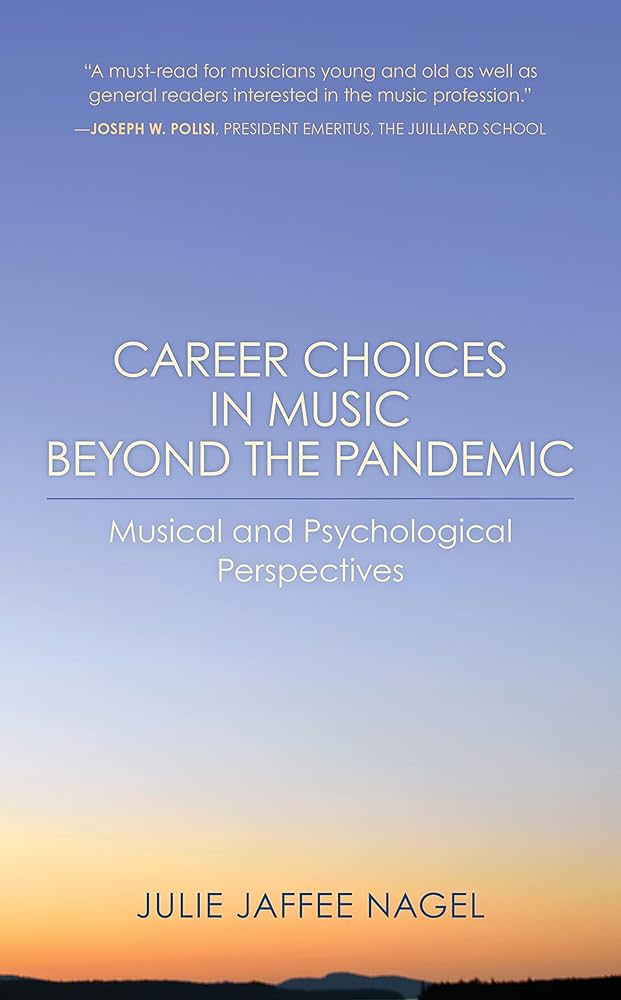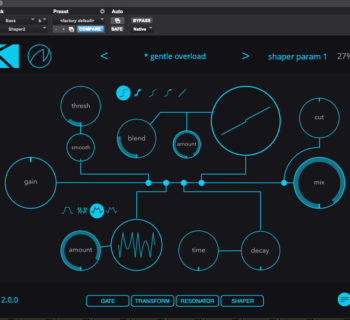Excerpted from Career Choices in Music Beyond the Pandemic, with permission from the author and Rowman & Littlefield
By Julie Jaffee Nagel
“I cannot write in verse, for I am no poet. I cannot arrange the parts of speech with such art as to produce effects of light and shade, for I am no painter. Even by signs and gestures I cannot express my thoughts and feelings, for I am no dancer. But I can do so by means of sounds, for I am a musician.”
— Wolfgang Amadeus Mozart, November 8, 1777
Imagine you are at a social event and are introduced to someone you do not know. In conversation, the person asks you about yourself. Would you, like Mozart, respond, “I am a musician”? Many people identify themselves by what they “do,” that is, their “work.” Typically, work is intimately tied to how we feel about ourselves; for musicians, it is also tied to how we express our deepest thoughts and emotions.
Musical development, as a part of psychological development, is deeply connected to our sense of who we “are” as well as what we “do.” A career in music occurs over a lifetime, often beginning unknowingly in childhood. When Mozart made his statement about being a musician, he was twenty-one years old. With the help of his father (a well-known violin teacher), he had begun piano lessons at age three; composed by age five, when he could play anything, he heard by ear after hearing it once; and toured Europe when he was six. Similarly, your identity as a musician develops over your life span and is bound up deeply with who you “are” and what you “do.”
As will be illustrated, various key experiences throughout life revive both earliest alliances and misalliances with parents and significant others. Musicians develop relationships with teachers, with their employers, with their instruments, and with their audiences who respond through applause (a nonverbal but also pleasurable sound that signifies approval and enjoyment). Because of the psychological potency of music, a career in music can be both highly rewarding and devilishly problematic. We may think of work as a way to pay the bills, but we also use it to meet needs that we are only dimly aware of. In psychodynamic jargon, basic needs for love and security for any individual tend to become sublimated—or redirected—into work. For the musician, the realization that earliest caretakers are literally life-giving and nurturing becomes projected later onto teachers and audiences. It is not a difficult leap to appreciate how roadblocks such as performance anxiety can be inhibiting and debilitating for those musicians who consciously or unconsciously fear rejection or disapproval from audiences or parents.
A discussion of developmental issues will help clarify the contrapuntal and complex features of personality embedded in human development that lead to a career choice in music. All the experiences that predate commitment to a career have bearing on occupational choice—for musicians and nonmusicians alike.
Erik Erikson: Development Over a Lifetime
The psychoanalyst and educator Erik Erikson (1902–1994) created a model that integrates emotional, physical, and social development over one’s entire lifetime. Erikson’s work is detailed in his classic book Childhood and Society. His theory that pertains to human biopsychosocial development is as relevant today as it was when his book was first published in 1950. This model is relevant for understanding career choice among other features of human life. Here I consider Erikson’s model of development as it pertains to music and music careers in particular.
Erikson’s work extends a classical theory of mind, which typically asserts that once children reach a certain age, generally late adolescence and young adulthood, they solidify their identity, particularly around career. Erikson maintains that people grow emotionally continuously from birth until death. Childhood and all relationships with parents and others (including audiences) are integrated into people’s lifelong development.
Erikson’s biopsychosocial approach to development illustrates that we do not totally “complete” one chronological stage of our lives, shed its challenges, and move on, unencumbered by prior emotional conflicts—as is the implication in Abraham Maslow’s hierarchy of basic needs. In Erikson’s schema, we do not (cannot) totally resolve all age-appropriate issues before we move to the next chronological stage of our lives. Our birthdays do not stop coming, but our emotional development may be hindered or even slip backward during times of stress only to reappear as challenges at later ages. I witness this occurring in the problems that people present in therapy in which old issues resurface and personal history repeats in new variations. They (and I) find it challenging and satisfying to resolve some unfinished business so that they can continue to evolve less encumbered by old ghosts that have remained in the mental nursery.
A cellist, Bill, explained his attraction to music as a child: “The cello was something special that I did… and when I was in school I did it better than anybody else. My parents were proud of me, and other people applauded me when I played in school.” Bill attended music camps during the summers and reported that “I met people that were very similar to myself… and I really liked that. And that gave me confidence. I met people out there who spoke the same language and so, when I’d go back to school, I’d feel a lot more confident because I knew that I had a niche in life with my music.” Over many years of working with musicians, I have learned from Bill and from many others how playing music as a child and later as an adult provided a sense of uniqueness, comfort, and self-expression. Music sustained them when pressures in day-to-day environments and past and present relation- ships presented obstacles.
Psychological (and musical) growth does not occur linearly like a jet air-plane taking off from the runway and rising straight upward into the clouds. People, and their careers, encounter turbulence and stormy weather conditions that require detours and sometimes discomfort. Skill, flexibility, training, ability to problem-solve, and greater understanding of oneself allow the pilots (or the performing musicians or educators) to have the confidence and ability to alter their courses so that all is not lost (and performers and performances do not crash). With professional help and new insights, smoother flights and safe career landings can feel less jarring or career ending.
Ratios: Life as a Balancing Act
Erikson speaks of “ratios” when describing the resolutions of opposing feelings, thoughts, and behaviors through every stage of life. Each stage is cumulatively influenced by previous stages. This perspective suggests that we never fully resolve what ego psychologists call “conflicts” but rather discover our best adaptations (or “favorable ratios,” i.e., a good-enough balance) to cope more effectively with the competing wishes and fears that we all experience in our mental lives. One’s sense of personal and professional identity in any career evolves from a series of both resolved and unresolved emotional milestones throughout life. Erikson’s ratios refer to a “favorable” or “unfavorable” balance achieved, sometimes with the assistance of professional help. Favorable, adaptive “ratios” become embedded in flexible biopsychosocial timetables rather than exact ages, as the following chart indicates.
Taking a wide-angle and lifelong view of our personality and emotional development, with a focus on eight individual stages, is meaningful as we begin a deeper exploration of career decisions. For example, a performer learned that it was not only the cold temperature of the room that made her unable to play an instrument with a secure technique. She complained about her symptom of cold hands and other conscious realistic reasons to explain why she felt uncomfortable. However, I also learned that the performer had a very “cold” and distant mother—now represented by her fears about audience reception or rejection—whom she felt she needed to impress in order to feel loved. Psychological pressures experienced by the performer to impress the “cold,” rejecting audience or parent were “explained” by the coldness of the room temperature that prevented a dazzling technique required by the performer’s harsh ego and superego, which magically would result in a warmer attitude from her “cold,” distant parent.
Fantasies and beliefs carried over from earlier childhood, including magic thinking about “making” things happen and “making” people like you, become modified through deeper psychological understanding. Revised and reexamined, old thoughts can revise symptoms, projections, and need for external explanations (e.g., the cold room) from earlier developmental stages when thinking was very concrete. Bringing new understanding to old problems is eye opening, comforting, and healing.
When a more favorable ratio is achieved between the major opposing dis- positions at a given stage, psychological growth continues to a more mature and satisfactory way of reducing internal pressures. Under duress, individuals typically retreat emotionally and regress to earlier stages of development without realizing there is unfinished emotional business. Some unfinished psychological homework is lurking in their emotional undergrounds.
No performance is “perfect.” No individual is flawless. Optimally, music performers can find flexible-enough strategies to rethink and rework ineffective earlier psychological “solutions” (that may have been effective at one time) when they remain open to new options to free themselves from the lurking ghosts haunting mental life. These mental apparitions appear un- expected and unwanted. We develop resilience by recognizing and making peace with our uninvited intruders.
Identity as a musician is connected to how we cope with, not avoid, our lifelong enduring psychological, biological, and social development at every life stage. We can learn from regressions about disappointments as well as from forward movement and find success that we never realized was possible. Deep, substantial, satisfying change is more complex than simply thinking positively, avoiding looking inward, or working harder, but it can be attained through revisiting and revising persistent ineffective coping strategies.
I am reminded of a cartoon I saw years ago. It showed a man on a bicycle, huffing and puffing as he rode with a monkey on his back. It was unclear where he was going. I fantasized that his destination was his therapy appointment. The bicyclist looked worried and distracted. Next, we saw the man riding his bicycle back in the opposite direction. This time, the monkey was sitting next to him in a sidecar. The man looked relieved and was pedaling less furiously. He no longer was carrying his metaphorical heavy emotional weight behind him. The monkey was more observable to him and was no longer a heavy burden or out of sight. In fact, the monkey was now in the sidecar, suggesting the heavy (psychological) burden on the man’s back—or in his mind—had been removed or at least was better balanced. There was a lighter emotional weight upon his shoulders.
As you might surmise, this was an outcome of reaching a favorable “ratio” of a preexisting impediment experienced by the bicyclist. The problems we carry around unacknowledged and undiscussed can feel like heavy weights on our backs (and inside our minds). They can be dislodged and revised adaptively. While still present (in a sidecar seat), heavy and haunting issues can become less formidable when viewed from a different perspective when they no longer weigh us down emotionally or take a toll physically.
Julie Jaffee Nagel is a graduate of The Juilliard School, The University of Michigan, and The Michigan Psychoanalytic Institute. She is in private practice in Dexter, MI. Career Choices in Music Beyond the Pandemic is out now, as are her other books Managing Stage Fright: A Guide for Musicians and Music Teachers, and Melodies of the Mind. Visit julienagel.net for more info.















